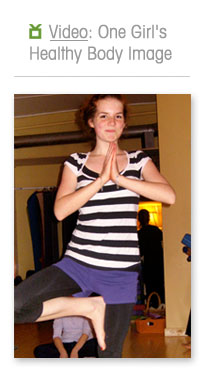
Follow these Good Health Rules for optimal health:
Rule #1: Feeling Good About Your Body
Rule #2: Developing Healthy Eating Habits
Rule #3: Practice Safe Sex
Good Health Rule #1: Feeling Good About Your Body
Women are constantly bombarded with messages from peers, family, and the media about what their bodies should look like. It comes as no surprise that their body image may suffer as a result. Here are some tips for teens and their parents to get on the road to good health via a positive body image.
5 Tips to Improve Body Image
- Focus on your strengths
Negative thoughts are detrimental to your body image. Rather than reminding yourself of what you don't like about your body, focus on what you do like. This will help you feel more confident about what you see in the mirror. - Eat right
Health comes in all shapes and sizes. Make sure you are getting the nutrients you need by paying attention to what you put into your body this places the importance on health, not weight. - Stay active
Regular exercise can improve your strength and cardiovascular health, not to mention your confidence. Becoming fit and active allows you to appreciate your body for what it does, rather than what it looks like. - Don't compare yourself to others
Remember that the made-up, airbrushed images you see in the media aren't real. Beauty comes in many different shapes and sizes, so focus on becoming your personal best rather than trying to live up to unrealistic standards. - Concentrate on your goals and dreams
Take the focus off what you want your body to look like and think about the kind of person you want to be. Doing well in school and developing hobbies and interests will allow you to feel good about who you are on the inside.
Associated Content
- 5 Tips for Building a Healthy Body Image (theadventurouswriter.com)
- 7 Tips for Helping Your Daughter Deal with Teen Poor Body Image (associatedcontent.com)
5 Tips on Body Image for Parents of Teen Daughters
- 1. Body Image Breakdown: More than 70% of girls aged 15-27 feel bad about their appearance and avoid normal daily activities, such as attending school.
TIP: Your daughter's body image starts with you! Show her each and every day how great you feel about your body and looks. That will begin to set the tone in teaching your daughter about appearance and what it means to be proud of who she is inside and out. By not insisting your daughter conform to a certain style whether it is what she wears, how her hair looks, or how she has to behave in what she is wearing you will build the foundation for how she sees her body. - 2. Super Girl Syndrome: Girls may respond to the pressure around them from school, media, parents, and peers not only by trying to do it all (look perfect, get good grades, and have a busy social life), but trying to do it all perfectly! Their quest for "super girl" status can stress them out and cause their self-esteem to plummet.
TIP: Encourage your daughter to find her favorite one or two activities and focus on them, rather than trying to be the best at a multitude of things. By honing in on activities/skills she can excel at, she will be better able to set realistic goals for herself and more easily recognize her accomplishments. Set an example for her by doing the same thing in your life. - 3. Clashing with Cliques: The teen years are an age when everyone is trying to define themselves and establish their independence. From jocks and geeks to drama queens and cheerleaders, cliques are rampant in middle school and high school. Trying to fit in can be exhausting.
TIP: Help your daughter recognize that being authentic is better than any label out there. Encourage her to embrace all different types of people and not to limit her friendships to just one group of peers. Expressing her own diversity in what she likes to do and who she likes to hang out with will help her remain well-balanced and true to herself. - 4. Sexual Pressure: One in 10 girls is unable to say no when a boy asked them to do something that made them uncomfortable. In fact, girls with low self-esteem are four times more likely to engage in activities with boys that they have ended up regretting later.
TIP: Do not avoid "the talk!" Have open and consistent conversations about sexual boundaries with your teenager. Use everyday media examples (her favorite TV show, a pop song on the radio) to discuss the pressure girls face to be sexually active. Let her know you will not judge her for the things she shares, but you are there to help her navigate through this tricky time. - 5. Creative Communications: The top wish expressed by girls is for their parents to communicate more frequently and more openly with them, as well as talking about what is happening in their own lives.
TIP: We all know getting your teen girl to open up to you can be like talking to a brick wall. Find ways to engage with your daughter such as doing an activity together (run a 5K or learn to knit). By participating in things you have in common, you may find that the conversations begin to flow more frequently.
Real Girls, Real Pressure: A National Report on the State of Self-Esteem (Dove, 2008)
Good Health Rule #2: Developing Healthy Eating Habits
Given the rigorous pace of contemporary lifestyles and the normalization of increased portion sizes, we often develop unhealthy eating habits that increase our risk for diabetes, heart disease, unnecessary weight gain, and other detrimental health conditions. Educating yourself about food content, monitoring your caloric intake while getting the nutrients you need, developing a meal plan and sticking to these healthy eating habits will keep you on a path to optimal health.
5 Quick and Easy Healthy Eating Tips
- Stop Dieting
Diets are restricting, punishing, and discouraging. Leave dieting behind and make the decision to live a healthier lifestyle. Once they stop dieting, 95% of dieters gain the weight back, and repeated instances of "yo-yo" dieting is harmful, both physically and mentally. Make small, permanent changes everyday instead of drastic changes overnight. - Slow Down
Many of us have the unhealthy habit of "power eating." We are often hard pressed to find the time to sit down and enjoy a meal, instead eating on-the-go which can lead to eating more than we need to feel full. Enjoy food by chewing and taking breaks between bites. The constant food-in-mouth consumption model is not conducive to a healthy lifestyle; by slowing down, we are able to enjoy what we eat and feel satisfied sooner. - Out of Sight, Out of Mind
Don't leave snack foods on the counter or at your desk where you will be tempted to munch mindlessly. Bring pre-made snacks when you're on the go to avoid consuming nutritionally void calories like chips and candy. - Eat Often
Three hearty meals a day doesn't work for everyone and can often lead to binge eating. Never let yourself get so hungry that you are willing to settle for junk. Eat smaller meals, five times a day, to fuel your body with heart-healthy foods that will add nutrition to your diet and better your mood. - Avoid Eating When You're Full
Many of us mistake the uncomfortably "full" feeling for the comfortably satisfied feeling of eating just the right amount. Overeating leads to feeling sluggish and lazy. Food is supposed to activate our bodies, not sedate us. Avoid eating when you feel energized and remember it is all right to leave food on your plate. Eating for pleasure is still okay, though only in moderation.
Good Health Rule #3: Practice Safe Sex
With more than 12 million Americans becoming infected with sexually transmitted diseases each year, practicing safe sex is crucial to maintaining your health and the health of your partner. Fortunately, there are things you can do to lower your risk of contracting a STD. When it comes to having sex, "better safe than sorry" is the rule of thumb.
Top 5 Ways to Avoid Contracting a Sexually Transmitted Disease
- Consistency is Key
Make up your mind to practice safe sex every time. Use a condom, female condom, dental dam, or gloves every time you have oral, anal, or vaginal intercourse to prevent contracting a STD. Safer sex with protection only works if you protect yourself every time. - Get Tested Regularly
Part of protecting yourself against a STD means getting tested regularly and being treated immediately, if necessary. It is critical to get tested when entering a new relationship and to make sure your partner is STD-free, too. Most cities offer free or discounted STD testing services; take advantage of such services. - Keep the Goods Close by
It can be difficult to think rationally about your health when in the throes of intimacy. Remember to carry protection on you at all times so that you will be ready when the moment arrives. For a long time, men were expected to carry condoms in their wallets; however, it is your responsibility to "pack the goods," too. Being prepared will only improve your sex life. - Ditch the Drugs and Booze
It's much more difficult to make responsible decisions about sex while under the influence of drugs and alcohol. You might wind up foregoing protection or sleeping with someone you wouldn't otherwise have chosen as a partner. Make up your mind before you start drinking to have sex with someone you know or not to have sex at all. - Communicate with your Partner
Open communication is the key to safer and more enjoyable sex. If sex is an awkward subject to talk about with your partner, then you're not ready to have sex. Monogamous relationships eliminate your risk of contracting an STD, assuming both you and your partner have already been tested. It is important to be honest with yourself about your situation and practice safe sex if you're not sure your relationship is monogamous.


















